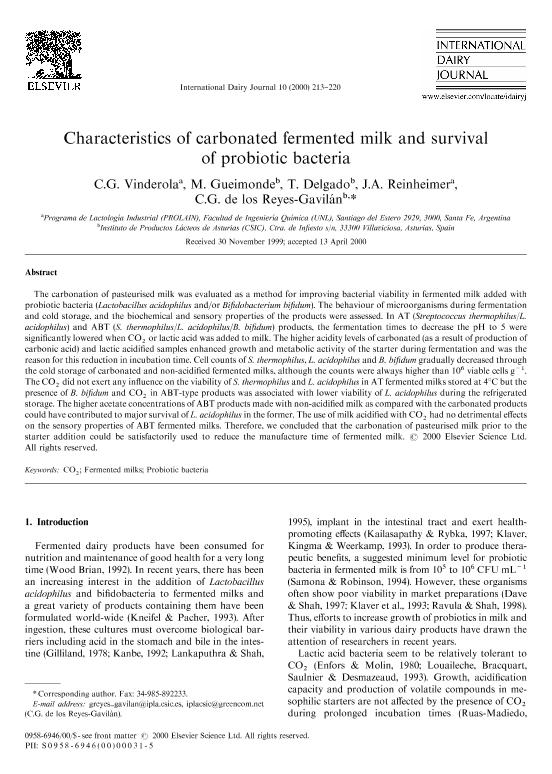Artículo
Characteristics of carbonated fermented milk and survival of probiotic bacteria
Vinderola, Celso Gabriel ; Gueimonde, M.; Delgado, T.; Reinheimer, Jorge Alberto
; Gueimonde, M.; Delgado, T.; Reinheimer, Jorge Alberto ; Reyes Gavilán, C. G. de los
; Reyes Gavilán, C. G. de los
 ; Gueimonde, M.; Delgado, T.; Reinheimer, Jorge Alberto
; Gueimonde, M.; Delgado, T.; Reinheimer, Jorge Alberto ; Reyes Gavilán, C. G. de los
; Reyes Gavilán, C. G. de los
Fecha de publicación:
06/2000
Editorial:
Elsevier
Revista:
International Dairy Journal
ISSN:
0958-6946
Idioma:
Inglés
Tipo de recurso:
Artículo publicado
Clasificación temática:
Resumen
The carbonation of pasteurised milk was evaluated as a method for improving bacterial viability in fermented milk added with probiotic bacteria (Lactobacillus acidophilus and/or Bifidobacterium bifidum). The behaviour of microorganisms during fermentation and cold storage, and the biochemical and sensory properties of the products were assessed. In AT (Streptococcus thermophilus/L. acidophilus) and ABT (S. thermophilus/L. acidophilus/B. bifidum) products, the fermentation times to decrease the pH to 5 were significantly lowered when CO2 or lactic acid was added to milk. The higher acidity levels of carbonated (as a result of production of carbonic acid) and lactic acidified samples enhanced growth and metabolic activity of the starter during fermentation and was the reason for this reduction in incubation time. Cell counts of S. thermophilus, L. acidophilus and B. bifidum gradually decreased through the cold storage of carbonated and non-acidified fermented milks, although the counts were always higher than 106 viable cells g-1. The CO2 did not exert any influence on the viability of S. thermophilus and L. acidophilus in AT fermented milks stored at 4°C but the presence of B. bifidum and CO2 in ABT-type products was associated with lower viability of L. acidophilus during the refrigerated storage. The higher acetate concentrations of ABT products made with non-acidified milk as compared with the carbonated products could have contributed to major survival of L. acidophilus in the former. The use of milk acidified with CO2 had no detrimental effects on the sensory properties of ABT fermented milks. Therefore, we concluded that the carbonation of pasteurised milk prior to the starter addition could be satisfactorily used to reduce the manufacture time of fermented milk.
Palabras clave:
Co2
,
Fermented Milks
,
Probiotic Bacteria
Archivos asociados
Licencia
Identificadores
Colecciones
Articulos(CERELA)
Articulos de CENTRO DE REFERENCIA PARA LACTOBACILOS (I)
Articulos de CENTRO DE REFERENCIA PARA LACTOBACILOS (I)
Citación
Vinderola, Celso Gabriel; Gueimonde, M.; Delgado, T.; Reinheimer, Jorge Alberto; Reyes Gavilán, C. G. de los; Characteristics of carbonated fermented milk and survival of probiotic bacteria; Elsevier; International Dairy Journal; 10; 3; 6-2000; 213-220
Compartir
Altmétricas



